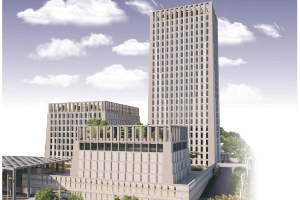My world today is indeed different from what I knew growing up in Accra, Ghana’s capital. I lived in Teshie/Nungua then with an uncle. In those days only the so called haves stayed in those buildings. Life was great then. I loved being at the community library. Though small even then, it could accommodate the few curious ones like me and my friends. There were play grounds every where- one around the library and vast green lands around today’s A-life (a super market) which could accommodate an Olympic stadium. I cannot forget that it was equally easy to get to Accra even during rush hour in less than an hour. And life was good!
Twenty plus years on, and my Accra is no longer the same. Any where I get to these days it appears the whole Accra has gathered- people everywhere. Where from, when and why so many people? I still cannot provide all the answers. I have some answers though. For instance I know the number of people in Accra from the “Ashanti Kingdom” have more than doubled since I was growing up. These days I also run into many people from my own kingdom; the undiscovered pride of Ghanaian Tradition and unquestionable hospitality- Upper West Region. My brethren from the rest of the Savanna have not been left out in the movement towards Ghana’s pinnacle of prosperity- Accra. I see many of such brethren engaged in all sorts of jobs. Truthfully, all tribes, clans, religions, kingdoms and chiefdoms are heavily represented in the capital today.
At the point in time these people joined me, I cannot say but my guess is that they all came in whilst I was busy playing in the diminishing playing fields of Teshie/Nungua. Why everyone else has to come; I have looked at my own background and I see answers. The reasons are many but majority centre around economic and education.
Today, some of those who joined me whilst I was growing up have gone on to reproduce. The reproduced have several variations. Some are pure whilst others have had a mix of different ethnic blood running through their veins. Some have even lost track of their roots. But who can blame them. The economy has not been favourable enough to allow people to return to their roots to at least pay homage.
That is the life in my Accra today- difficult and people minding their own business. Today the metropolis has about two million people. I mean those in the Accra Metropolitan area alone. The overall population of Greater Accra stands at more than four million now and still growing. Still growing because all roads leading to the city centre are becoming friendlier. To the west for instance is the upgrading of the Accra-Cape Coast road. The east and north have not been left out. Even to the south where it is surrounded by the sea, the harbours are being rehabilitated to accept larger responsibility.
With the Accra Metropolis having about two million people (more than double some twenty years ago) challenges the very foundations that made the city attractive in the first place. A rapidly growing city, Accra now has to deal with various socio-economic problems including robbery, streetism, prostitution, unemployment, high cost of living, poverty, hunger, etc. Formal employment in the entire region has become a problem and this has driven nearly 70% of employable population into the private informal sector. The private informal is characterised by a lot of uncertainty and this does not ensure job security. The large private informal sector puts the lives of many families at risk because of the lack of supporting policies.
Agriculture is important in all parts of Ghana. It ranks ninth as a primary livelihood category, but ranks second as a secondary activity, and second as a tertiary activity in Accra. This is how important agriculture is in the city of Accra where it is hardly supported by any government policy. People also shun away from agricultural produce of the city for health reasons. They claim farmers in the city use waste and polluted water and this goes to affect the health of crops and that of consumers.
What we all need to do is find answers to the problems of agriculture in the city. Given the importance of agriculture in Accra it is not a bad starting point. In fact supporting urban agriculture has a very positive multiplier effect of ensuring urban food security, job creation, gender equity, and a host of differential effects all culminating in poverty reduction. Food and its security are fundamental to human development. Job creation, availability and security ensure livelihood security. Gender equity and its concerns once upheld can secure the survival of many of the 33% households headed by women.
The responsibility of ensuring that the teeming population at least has a choice and satisfaction of food is one that can easily be fulfilled by encouraging agriculture in urban centres. Food must not just be eaten to fill the stomach. Food must be of good quality, nutritious, sufficient and accessible (both physical and financial) . The city has the capacity of meeting all its vegetable needs and to large extent its cereal needs especially, maize. Making agriculture functional in the city will guarantee choice and satisfaction and go a long way to ensure access to food and nutrition for many.
To lay the foundation for a functional agricultural base in the Accra area requires clear commitment in policy formulation and implementation. The policy must clearly support land use for urban agriculture, water use and management, and handling of output. Some lands must strategically be located and allocated for the purposes of agriculture in the city. In the location and allocation process, handling and marketing which can be good sources of contamination should be factored in.
Water currently used for urban agriculture is truly polluted and could have serious health implications for consumers. But the water is polluted probably because we have no clear policy promoting urban agriculture, ignorance or both. We need to build more waste water treatment plants to support the only one currently in operation. Treated waste water is devoid of diseases and bacteria and if used then people will not have to be concerned about their health at least at the farm gate.
A major source of contamination of produce from agriculture in general occurs between the farm gates and consumer. Vegetables are the main products of urban Accra but vegetables are also easily polluted. It is for this reason that other actors in the supply chain must be made to act responsibly. This will first of all require a policy direction and education. Once this hurdle is cleared, efforts can be geared towards the rather negative perception sections of the population have about urban agriculture.
Urban agriculture secures the livelihoods of urban dwellers by securing their incomes. By promoting urban agriculture in Accra, we stand a chance of reducing the cost of food in the area, securing livelihoods, increasing incomes and thereby reducing urban poverty. All of these have an overall positive effect on urban planning and management.



















